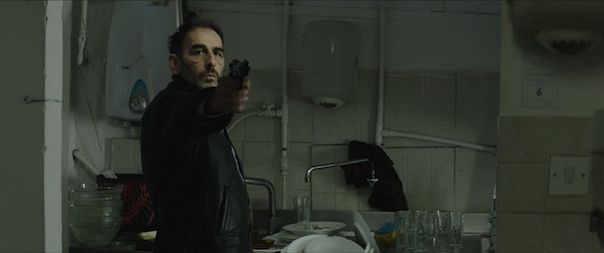Big Fish, Little Fish
Christina Newland of the 2014 Talent Press reviews STRATOS, the noir-tinged Greek tale of a hitman living through the economic pinch. The film had its premiere in the Competition section at Berlinale this year.

Yannis Economides' STRATOS
STRATOS (TO MIKOS PSARI, Greece) is a steadily uncoiling noir drama with all the trappings of a genre film. As is often the case, this belies its intent, where a socioeconomic depth is revealed beyond the conventions of the plot. The story involves a middle-aged hired killer, Stratos, who does the occasional hit for a wad of cash and the rest of the time rolls filo dough in a factory, hairnet and all. Speaking to his jailed, long-time boss, he claims to have “lost his nerve“ for killing. Naturally, this cannot be the case for long. After a series of provocations from various unsavory elements, Stratos reluctantly takes up his gun, shifting from chilly hired killer to quasi-vigilante.
With a wide-angle lens, Economides casts his eye toward the arid, craggy landscape of Northern Greece, the looming blue mountains, lonely roads, and graffiti-strewn housing projects where Stratos lives. Without any overt allusions to the economic crisis, the film evokes a stillness and the sense of community in collapse. Partitions – usually windows – are a frequent visual motif, either half-obscuring the figures onscreen or shielding them from the exterior world. They become a pointed visual stand-in for the solitude of our protagonist, an ascetic man reminiscent of those in Jean-Pierre Melville's universe.
The ominousness of the environment is reflected in continual close-ups of lead actor Vangelis Mourikis, who, with his hooded eyes and sallow complexion, has a strikingly mournful face. The actor has an almost Bressonian impenetrability, but for the odd flicker of contempt or apprehension. Stratos has the kind of presence that drives others to restlessness. His friends, associates and bosses don't know how to respond to his silence; they repeat themselves, talk in circles, even become increasingly irate. He looks on quietly at a world where loyalties exist on shifting sands, and corruption is endemic.
The old bromide “desperate times...“ has an entirely darker facet here, with Stratos' neighbors Makis and Vicky willing to sacrifice any modicum of dignity to pay off their debts. “The big fish eat the little fish”, someone snarls at one point. This vicious cycle of exploitation plays out accordingly. Those who are exploited follow the example of those who exploit them, sliding into moral inertia. STRATOS suggests a wide-reaching indictment of Greek society, holding everyone to account for a messy state of affairs. Stratos, too, is culpable, and he, like the others, must find either redemption or reckoning.

